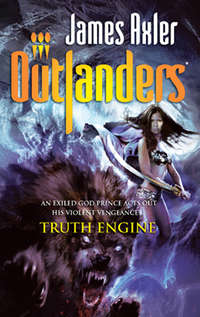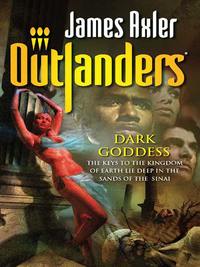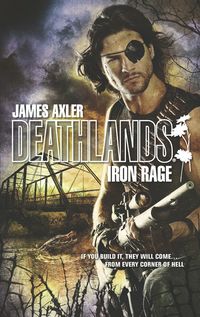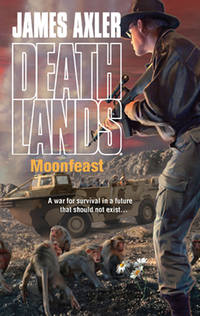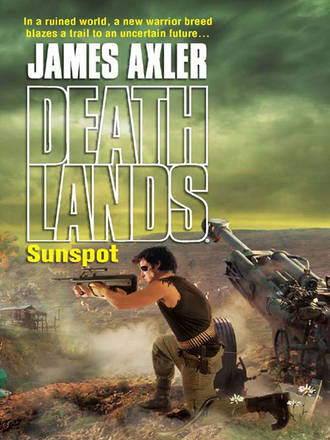
Полная версия
Sunspot
As Ryan and J.B. scrambled from the bluff, Jak waved the others after him and headed down-channel.
Bezoar was the only one who didn’t move to follow. The old swineherd sat slumped on the rock, his bad leg sticking out straight, his face still beet-red. Young Crad turned back to help him get to his feet.
“It’s no use, boy,” Bezoar said, impatiently waving him off. “This old gimp can’t run anymore. You go on without me, boy. Save yourself.”
Young Crad wouldn’t hear of it. “I go, you go,” he said. He bent and picked up his comrade, piggyback. Then, as if the added burden was nothing, he broke into a trot, chasing after Jak.
“That one’s something special,” Mildred commented as she, too, started to jog.
“Short on words and brains mebbe, but long on heart,” Krysty said.
“Droolie sure can run,” J.B. admitted.
“Better catch them,” Ryan said, again bringing up the rear.
As the companions tightened ranks, winding past a maze of dry channel braids, the raindrops got bigger and closer together. The wind whipped the branches of the scrub brush and sent chest-high tumbleweeds bounding and rolling down the riverbed past them. No matter how hard the rain came down, Ryan knew they couldn’t stop to wait out the storm, even if the trail they left behind was obscured. The only thing that was going to save them from the pursuit was distance. Only if the dogs and horses couldn’t recover the lost trail were they home free.
In a couple of minutes Ryan’s clothes were completely soaked through. Falling raindrops hit the earth with such force that they jumped two feet in the air. Daylight began to fade. He looked over his shoulder, squinting into the wind and the looming darkness. In a strobe flash of lightning he saw the approaching squall line, like a vast waterfall stretching across the plain from edge to edge. Amid the wind’s howl and the thunder’s boom, he could hear dogs baying, not far behind.
As the storm closed on them, it rained even harder. So hard it came down in rattling roar. So hard that it hurt as it hammered upon unprotected heads and shoulders. So hard it was difficult to breathe with all the water vapor in the air. The parched desert earth couldn’t soak it up. The ground turned to cooked oatmeal underfoot, boot prints filled with water as fast as they were made. A section of saturated bluff to their right collapsed, sliding partway across the channel. Ryan veered and jumped the barrier, splashing down knee-deep in a muddy, coffee-and-cream-colored pool. The runoff was funneling from high ground to low. Ahead, shallow stream channels filled and overflowed, coalescing into broad stretches of shin-high rapids.
The muffled baying grew suddenly louder. When Ryan looked back again, through the shifting downpour, he saw the dogs—drop-jawed, with lolling tongues, legs driving, splashing through the stream. Behind the hellhounds, torrents of water sheeted over the backs of charging horses and riders.
“Up!” he bellowed at Jak through a cupped hand.
The albino was already doing just that. Because the crumbling bank on the right would never have held the companions’ weight, he led them in the opposite direction, to the crest of a teardrop-shaped, scrub-covered island, high ground where they could make a stand.
As Ryan high-stepped through the boot-sucking muck of the island’s beach, he heard a growing rumble like an earthquake and half turned. Surging up behind the dogs and horses was a foaming wall of milky-brown water ten feet high.
“Hang on to something!” Krysty cried out to him.
As Ryan grabbed hold of the branches of a low bush, the flash flood slammed into the mounted pursuit. The force of the wave and its load of debris bowled over the horses and riders. It swept away the dogs in an instant. For a split second Ryan glimpsed the head of a horse as it bobbed up, rushing past, its eyes wild with fear, then it disappeared under the churning surface.
The one-eyed man used the scrub limbs to pull himself to higher ground where his companions stood braced, their legs sinking deep into the soggy soil, their miserable, streaming faces lit by lightning. Ryan jammed his boots against the roots of the brush to help hold his position.
“What happened to the pursuit?” Krysty asked.
“Long gone,” Ryan told her.
“The water level is still rising,” Doc said. “It appears we’ve departed the frying pan only to land squarely in the fire.”
There was no doubt about that. Their little mound of safety was growing smaller and smaller by the minute; the river flowed around their knees. Ryan could feel the ground eroding from underfoot.
“What are we going to do?” Mildred said.
Krysty looked across the mocha-colored river. “Too strong a current to swim through,” she said. “We’d never make it to the bank.”
“Only thing we can do is wait it out,” Ryan said. “Hang on and hope we don’t get washed loose before the river starts to fall.”
After a while the torrential rain stopped, but the river continued to come up; soon it even submerged most of the brush on the island’s crest. Clustered together, the companions grasped the ends of the branches, half swimming at times, their legs dangling back in the flow.
It was looking worse and worse.
When Jak shouted a warning, Ryan looked up to see a row of weak yellow lights bobbing toward them along the bank.
“Surrender or be swept away!” someone shouted over the roar of the torrent.
There was little question who had come to their rescue.
And under the circumstances, the companions couldn’t reach for or raise their weapons.
“We could let the current take us downstream,” Krysty said. “Mebbe get past them.”
“The odds of running those rapids and surviving to tell the tale are slim at best, my dear,” Doc said.
“Too many downed trees in the flow,” Ryan said. “We’d get snagged and never come up.”
“Drowning doesn’t suit me,” J.B. said.
“J.B., you’re half drowned already,” Mildred said.
“That’s how I know.”
“We can die now, without firing a shot,” Ryan said, “or we can try to live long enough to fight at a time and place of our choosing.”
“Proposed in that way, it is an easy decision to make,” Doc said. “There is only one acceptable course of action.”
Ryan looked from face to face. “Are we all agreed, then? Is anyone opposed?”
But for the sounds of the river, there was silence.
“We give up!” Ryan bellowed, though this genuine surrender stuck mightily in his craw.
“We’ll throw you a rope,” someone shouted back. “Make it fast at your end.”
J.B. managed to trap and tie off the line, lashing it around the submerged trunk of a stunted but sturdily rooted tree. One by one the companions used the rope to pull themselves, hand over hand, through the chest-high current to the light of the lanterns.
Ryan was the last to ford the swollen river. As he climbed out of the water, a horseman approached. Black-gloved hands held the reins of the towering chestnut stallion. The rider was dressed in a gleaming black rain cape. Covering the lower half of his face, nose to chin, cheek to cheek, was a matching leather mask. An oval of metal mesh in front of his mouth allowed him to speak unmuffled. There were angry boils and sores on his high, pale forehead. The eyes above the mask were black and wide-set; his shoulder-length, wavy black hair lay plastered to his head by the rain.
There was no mistaking who it was.
Malosh the Impaler.
Chapter Two
A tall, broad figure in an olive-drab trench coat and size-14 patched tennis shoes climbed the steep, barren approach to the base of the Rabbit Ear Spires. The gusting wind beat his BDU pants hard against his legs. His head was shaved except for a fringe of dirty blond hair that fell from the back of his neck to between his shoulder blades. A wide, black-tattooed garland encircled his deeply suntanned skull.
The permanent crown symbolized his authority.
Kendrick Haldane had been declared baron-for-life by a grateful populace.
At a switchback halfway up the trail of loose volcanic scree, Haldane paused to catch his breath. In the valley far below, the Grandee glistened in the slanting sun like a fat green snake. The world-shattering, nuclear exchange of 2001 had freed the great river. Shock waves from ground-burst missile strikes had ruptured the Elephant Butte Reservoir dam some fifty miles upstream, spilling three hundred billion gallons of water and a vast, scouring sediment load into the ancient riverbed. Like falling dominoes, the Caballo, Percha and Leasburg dams had given way under the power of the unleashed torrent.
The once again wild Grandee was the lifeline of Haldane’s small, prosperous fiefdom; and not just because of the water it supplied for agriculture and livestock. Old Interstate Highway 25, which paralleled the river and connected the cities of Albuquerque and El Paso, was also a casualty of Armageddon. Most of its overpasses and bridges had collapsed, many of its roadbeds either washed away by nukeday’s flood or eroded to sand by decades of chem rain. With the highway mostly gone, the river had become the prime north-south trade route. It was also a defensive barrier to attack from the west.
Between the still-lethal ground zeros of Albuquerque and El Paso, a narrow habitable strip along the Grandee supported a dozen thriving villes. Baron Haldane controlled nearly one hundred miles of riverbank with watchtowers and small fortifications set on cliffs above the stream, and from bankside caves. Based in these strategic squeeze points, his sec men intercepted and dispatched coldheart robbers and bands of marauding muties. In return for a guarantee of safety, every farmer, every traveler, every trader paid the baron a fair toll, either in jack or in a percentage of goods.
Haldane’s seat of baronial power lay beside the river in the valley below him. It had been built on the ruins of the city of Las Cruces, north and west of the El Paso–Fort Bliss nukeglass crater, about forty miles north of what once was the New Mexico–Chihuahua-Mexico border. Earth-shaker warheads had rubbleized the predark town; cataclysmic dam failures had swept away most of the debris. Its university, museums, shopping centers and the grid work of residential streets were gone. On the outskirts of the redrawn flood plain, a few of the original industrial sites and warehouses still stood, but they were skeletal relics, with sagging roofs and breached walls. Nueva Las Cruces, or Nuevaville for short, had been constructed well back from the Grandee’s new shoreline. Amid groves of trees and green cultivated fields were clusters of immobile mobile homes, dilapidated RVs propped on cinder blocks, and tractor trailers with crude windows cut in their sheet-metal sides. Scattered among the predark-vintage structures were one-story huts and longhouses built with recycled materials, walls made of piled chunks of broken concrete, and of dried river mud reinforced with mats of willow sticks.
Two-thirds of the barony’s population tilled the land, processed surplus food for storage and sale, or worked on a fleet of transport barges. The rest of Haldane’s subjects were full-time men-at-arms. From the towering height of the Rabbit Ear Plateau, his capital looked bucolic and peaceful, as if time had been reversed. As if Armageddon had never happened.
It was an illusion, he knew.
In the hellscape, safety and stability were the products of a bloody endless fight. Deathland’s hardship and brutality reduced everything to the lowest common denominator: simple survival.
Us versus them.
Played out over and over again.
A war of attrition, until there was no “us” or “them” left, and the last, faint hope of humanity’s rising from the ashes of Armageddon winked out forever.
As Haldane resumed the climb, struggling up a slope that constantly shifted underfoot, he leaned into the wind. From the belly of a line of black clouds to the northwest, lightning licked down at distant mountaintops. Thunder rumbled. In perhaps two hours, three at most, the storm would be hard upon them, turning Nuevaville’s dirt roads to mire and spilling the river over its banks.
Looming above him were the snaggle-tooth pinnacles of the Organ Mountains. With the wind to his back, he followed a well-worn path along the base of the spires. It led to a broad cave in the bedrock, about ten feet high at its tallest, and five times that wide across. Inside the low opening were crude structures built of mud-and-straw bricks. From glassless windows and doorless doorways, rows of faces peered out at him, luminously pale, as round as full moons. He smelled burning excrement, which the cave dwellers dried and used as fuel for heat and for cooking. The filthy hands of three generations of inbred doomies directed him toward the stone hut that stood a few hundred feet down-slope.
As was the custom, Baron Haldane left his blaster outside the rude sanctuary. He unslung his Remington Model 1100 12-gauge autoloader. Its barrel and magazine were chopped down to the end of the forestock, its rearstock cut off behind the pistol grip. After he carefully set the truncated, hellacious scattergun on the ground, he pushed aside the brown polyester blanket that covered the hut’s doorway, ducking his head to enter. As he did, he was greeted by an explosion of snorting laughter.
Dim light streamed into the structure through uncountable cracks in the walls. There was no fire laid on the floor, nor candles lit for fear of igniting the dizzyingly sweet, flammable vapors concentrated therein. As his eyes adjusted to the dark, over the wind sighing through holes in the masonry, the baron heard a gurgling sound. It was from the spring that welled up from a deep fissure in the bedrock.
On a tripod chair positioned directly over the stone vent, enveloped in lighter-than-air petrochemical perfume, sat the oracle. The eighty-five-pound doomie’s sole garment was a diaper made of a once-white T-shirt. He sat with eyes tightly closed, a halo of wispy white hair crowned his knobby skull. Pale skin like parchment hung in folds from under chin and arms. Drooped down his belly were flapjack mammalia, circlets of white hair sprouted around the wrinkled aureolas. The doomie’s chest heaved as he sucked in and held lungfuls of the strange gases, dosing himself for the foretelling.
There was no seat for visitors in the close confines of the hut. Haldane stood slightly bent over to keep the top of his head from bumping into the crust of chemical deposits on the wooden rafters.
“You know why I have come?” the baron asked.
The doomie stifled a giggle by clamping a hand hard over his mouth. He snorted and honked as he tried to control himself. The battle lasted only a second or two. Unable to maintain his composure, he fell into a fit of laughter that set his pendulous dugs flip-flopping.
When the soothsayer opened his eyes, they were alarmingly bloodshot. “A dark deed looms,” he said merrily.
“Yes, it does,” Haldane said.
“The darkest of dark-dark deeds,” the oracle stated. “The noble baron’s hands will drip with the blood of slaughtered innocents.”
Haldane nodded at the grinning doomie.
“You want to know if there’s a less brutal way to accomplish the end you desire,” the soothsayer said. “Some other possible strategy, some sequence of events you may have overlooked.”
“That’s what I want you to tell me,” Haldane said. “Do I have to use the terrible weapon I’ve been offered?”
The doomie shut his eyes and screwed up his face, huffing in and out to force down more of the fumes.
Though all members of the doomie race had the power to see into the future, the rock spring’s sweet gas greatly stimulated and focused their mutie supersense. It also made them very, very happy. Too much perfume and they swallowed their own tongues and strangled to death.
Most of Haldane’s norm subjects believed that the Creator spoke to them through the oracles of the hut. They believed that true future sight, unknown before nukeday, was a kind of compensatory gift, God’s way of saying “I’m sorry for rogering your world so soundly.” Ironically, these chosen vessels of the Supreme Being were judged unfit to reside in Nuevaville proper. When not engaged in unraveling the mysteries of the future, they were seen as filthy, moronic creatures of unspeakable habits. They were kept apart from those they served so tirelessly, in what amounted to a mountaintop doomie zoo.
The soothsayer huffed until his scrunched-up face turned dark and his limbs began to jerk spasmodically. After many minutes passed he opened his eyes and said, “I have looked into your future, Baron. I have seen the struggles ahead. For you there is no other path.”
It was not the answer Haldane wanted to hear.
No baron of the hellscape could be shy about chilling, about ordering others to do it, or doing the deed personally, if it came to that. In Haldane’s case, chilling had always been in the service of freedom or the dispensation of justice. The bands of coldhearts and muties that threatened his people and their livelihood deserved and received the ultimate punishment. Haldane had always seen himself—and had been seen by his subjects—as a defender and a shepherd, both wise and fair.
The course of action that lay before him was wise, but hardly fair.
In target, in scale and scope, in moral consequences, this chilling was different. Even by Deathlands’s standards it was the act of a depraved, unfeeling butcher.
“There will be so much death,” he said.
“You alone have the power to put an end to the cycle of terror,” the oracle countered. “You can prevent the deaths of those you hold dear, for decades to come.”
“I am not a mass chiller,” Haldane said. “I am not a monster. I am a protector. I fight monsters.”
“I have been shown what will be, Baron. You have no choice in the matter. You will put your beliefs aside to advance the greater good. You will become what you hate to achieve lasting peace and security for your people. And after you do this vile deed, I guarantee that history will understand, and forgive you for the excess. History is written by the survivors, and rewritten by their offspring. They will call you a military genius and hail you as the glorious saviour of your lands. A leader with the courage and the vision to decisively act, and thereby change the fate of this barony forever.”
When the baron said nothing in reply, the oracle twisted the metaphysical dagger he held, the dagger of premonition. “If you do not act, Baron Haldane, be assured that Malosh will,” he said. “What you so dread doing to others will be done to you and yours. Nuevaville will become a graveyard. This barony will be turned to dust and scattered to the winds.”
With those awful words ringing in his ears, Haldane staggered out of the hut. Though fumble-fingered from the fumes he’d inhaled, he managed to scoop up the Remington 1100. He caught himself as he reached out to push aside the holed-out blanket. At that moment he wanted nothing more than to blow the oracle apart with high-brass buckshot. But in his heart he knew that chilling the messenger wouldn’t do any good.
An oracle had predicted the fall of his predecessor, Baron Clagg, who had responded to the bad news by dragging the helpless doomie to the nearest cliff and throwing him off, headfirst. Clagg had then tried to change his fate by all means possible, but everything he had done only served to speed the grisly end that had been described to him. Old Clagg had been a typical Deathlands baron: shortsighted, cruel, despotic. His insatiable greed had started the conflict with Malosh, setting the stage for this most regrettable day.
Haldane slung the Remington sawed-off and, bracing himself against the wind, started to retrace his steps down the mountain. Knowing that the evil he was about to unleash was preordained and couldn’t be avoided did nothing to lighten the weight that lay upon his heart.
Chapter Three
While Ryan stood dripping on the edge of the riverbank, Malosh the Impaler leaned over in the saddle to give his prisoner a closer inspection. On either side of the masked baron, a dozen swampies dug in their heels, fighting to restrain more of the massive, growling dogs by their choke chains. Fanned out behind the stumpy muties were normal-size sec men carrying lanterns and predark Combloc autorifles. Pristine predark weapons were often unearthed from stockpiles and were traded across the Deathlands. Usually the wealthiest barons bought them.
Ryan knew just how quickly he could clear his SIG P226 from shoulder leather. If its action and barrel weren’t clogged with muck, he knew he could get off a shot or two before the swampies released the dog pack and the men opened fire. But the one-eyed man wasn’t a big fan of suicide, even if there was a bit of justifiable homicide thrown in the mix. His thought, first and foremost, was getting his companions and himself out of this predicament alive. To have any hope of success against such long odds, they had to wait for their chance and work as a team.
At that moment it was unclear whether Malosh was going to let the companions live long enough to do that; after all, they had taken out a number of his valuable fighters. Slaughtering the guilty parties where they stood would have certainly evened the score. Ryan decided to play a hunch. He figured the baron wasn’t just looking for cannon fodder. To win battles he needed hard-nosed, seasoned warriors. Courage in the face of death was the only hole card Ryan held.
“Didn’t your mama teach you it’s rude to stare?” he demanded of the baron.
Malosh glared down at him and said nothing.
For a second Ryan thought he had made the big mistake that was going to get them all chilled. He prepared himself to quick draw the SIG, determined to angle the first two rounds up through the baron’s chin and out the top of his head. Sensing the sudden increase in tension, the dogs’ hackles bristled, and they started snapping and snarling, scrabbling in the mud with all fours, dragging their struggling handlers forward.
“My mama was a gaudy house slut,” Malosh told Ryan, his black eyes glittering above the leather mask. “To my knowledge she never refused service to man or woman, norm or mutie. She took on her customers three at a time and gave every one his or her money’s worth. The only thing my sainted whore of a mother ever taught me was to get the jack up front.”
“Sound advice,” Ryan said.
Malosh leaned over in the saddle again, gloved hands resting on the pommel. “You know, I was just about to let my hunting dogs tear you limb from limb,” he said, “but now I see they’d choke on those brass balls of yours. A man like you will serve me much better in one piece.”
The baron waved his sec men forward. “Take them all back to the ville,” he said, then he wheeled his horse and spurred it in the direction of Redbone.
As the lanterns closed in, Ryan got a better look at the fighters’ faces. They were an odd collection of humanity and near-humanity. The norm men and women were wolf-lean, mostly in their late teens to late twenties. The swampies weren’t the only nuke-spawned horrors in the crowd, but the other muties weren’t from distinct subhuman species. Some carried prominent, angry tumorous growths on their heads and necks. Some had withered and clawlike extra appendages sprouting from their shoulders. Ryan saw no stickies among the ranks, but that was no surprise. Stickies didn’t do well in a military setting. Unlike swampies, they were creatures of uncontrollable urges. They had their own hardwired, homicidal agenda.
Sandwiched between norms, muties and dogs, the companions and the pair of swineherds trudged back along the high bank. It was soggy going; at times they struggled through knee-deep mud. By the time they crossed the farm fields and started back up the zigzag trail, the rain had stopped and the sky had lightened considerably. The sec men put out their lanterns and hung them from their belts.



